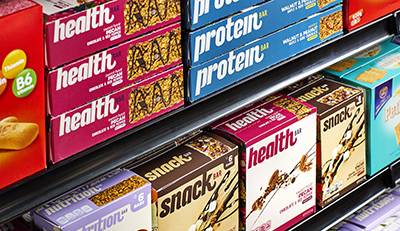Comprehensive Program
Comprehensive Program for Food-Contact Material Produced from Recycled Fiber
Background

Under authority of the Food, Drug and Cosmetics Act and the U.S. Food and Drug Administration (FDA) regulations, the use of pulp from reclaimed fiber is allowed for food packaging (21CFR.176.260). This regulation recognizes that the sources of reclaimed fiber may be either "industrial waste from the manufacture of paper and paperboard" or "salvage from used paper and paperboard...." In both cases, the regulation stipulates that the material may not bear or contain "any poisonous or deleterious substance... that migrates to the food except as provided in the regulations...."
In 1999, the Recycled Paper Technical Association (RPTA) and the American Forest & Paper Association jointly published a document, Guidance for Industry on The Use of Pulp from Reclaimed Fiber as a Component of Paper and Paperboard Products for Food Packaging under 21 C.F.R. 176.260. The Guidance identified steps appropriate to assure compliance with FDA expectations. To complement the Guidance, RPTA issued the first edition of its Chemical Testing Protocol for Food Contact Paperboard Made from Recycled Fiber (RPTA Protocol) as a tool to help manufacturers of recycled paper, paperboard and containerboard identify substances in recycled fiber packaging substrates and determine the regulatory status of those substances.
Since then, the RPTA Protocol has evolved into a comprehensive program to assure that recycled paperboard and containerboard meet FDA expectations and can be a first choice for food packaging.
Comprehensive Program Elements

In December 2024, RPTA rolled out its most recent update of the Program to assure manufacturers of recycled paperboard and containerboard used in food-contact applications can continue to assure compliance with FDA requirements. The Program has been enhanced to comprehensively address the various regulatory requirements under the FDA statutory authority that apply to recycled paperboard and containerboard use in food packaging. The Program includes processes to address:
- Use of reclaimed fiber in paperboard intended for direct food contact as stipulated in 21 CFR 176.260
- Recovered fiber source control
- Use of additives suitable for food contact as stipulated in 21 CFR 176.170 and 21 CFR 176.180
- Microbiological testing to evaluate the surface purity ofpaperboard or containerboard.
- Good Manufacturing Practices to assure the product is not contaminated during the manufacturing process.
- Implementation of the Program’s chemical testing protocol.
- Product odor monitoring.
- Maintenance of adequate company records
RPTA Chemical Testing Protocol

From the beginning, RPTA developed the chemical testing protocol through the collaborative efforts of industry experts, outside consultants, and health-risk assessment experts. It addresses unintentionally added chemical constituents that are the subject of FDA regulations for food packaging and California's Proposition 65.
The RPTA Protocol contains a list of chemicals, along with their corresponding health risk-based allowable concentrations. It establishes a testing regime to evaluate levels of unintended chemical constituents in paperboard or containerboard and contains guidance on how to use the test data. In addition, it establishes a process for further evaluations should test results indicate that additional study is needed.
RPTA selects chemicals for inclusion in the Protocol based on the potential for their presence in recycled fibers because they are common industrial and commercial contaminants. Example classes of chemicals contained in the list include, but are not limited to:
- Azo Colorants/Degradation Products
- Heavy Metals
- PCB’s
- Pesticides
- Phthalates
- Polycyclic Aromatic Hydrocarbons
- Semi-Volatile Organic Compounds
- Volatile Organic Compounds
RPTA updates the list of chemicals in the Protocol and their allowable concentrations periodically. The list of chemicals contained in the Protocol is not static. Based on information from the U.S. Environmental Protection Agency, FDA, the US Department of Agriculture and other government and quasi-government entities, RPTA periodically revises the list to include new chemicals which could potentially be found in recycled fiber streams and have potential health effects. RPTA monitors changes to the underlying toxicological data used to develop the allowable concentrations for the chemicals, and updates the information contained in the Protocol as necessary.
RPTA Certification Standard
In 2017 the RPTA began a program to certify that each of its member mills was implementing the RPTA Program fully and consistently. RPTA partnered with NSF International to develop a certification scheme and to provide auditing services. The audit is a robust, onsite review of member mill procedures and documentation ensuring proper, thorough and consistent conformance with all aspects of the comprehensive program.
The RPTA certifies that each member mill certificate holder has processes in place to produce product which meets the stipulations of the RPTA Comprehensive Program for Food-Contact Paperboard Produced from Recycled Fiber and certifies that the management and manufacturing systems of the certificate holder have been audited and found to be in accordance with the requirements of Recycled Paperboard Technical Association: Comprehensive Program for Food-Contact Material Produced from Recycled Fiber.
Click here for a list of certified member mills.
Conclusion
The Comprehensive Program for Food-Contact Paperboard and Containerboard Produced from Recycled Fiber is a science-based tool that helps RPTA members comply with FDA's expectations for manufacturing food-contact packaging. The RPTA Comprehensive Program is a living document. RPTA draws on the knowledge of recognized experts in the field of risk assessment, authoritative scientific literature, and commonly accepted safety assessment techniques to present a methodology for achieving this purpose.
The Comprehensive Program is a confidential and proprietary licensed product of RPTA. It is available only to RPTA members. For information on becoming a RPTA member please contact Paul Schutes at pschutes@rpta.org.